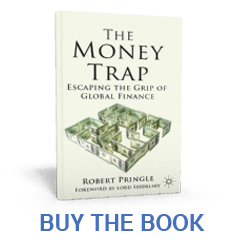The importance of getting money right
The lifechances of seven billion people are shaped by global money
The experience people have of the world, their life chances, what they learn, how they live, where they live, indeed their entire social and personal lives are shaped by monetary relationships, the monetary economy and thus to the world monetary system to an extent completely unprecedented in history. This means getting money wrong will have devastating effects for the entire world.
Before the 19th century, apart from its long-standing use in trade and imperial finance, the monetized economy extended to certain markets, classes and occupations in a few countries in western Europe and North America. Despite the vast advance in the use of money globally in the first great age of globalisation pre-1914, most markets were local with prices set locally. Of the one billion people in the world in 1900 only a small fraction were connected by monetary relations to global markets.
By the 1960s, when world population reached 3 billion, goods and labour markets were monetized in western Europe, the Americas, Australasia and Japan. Physical planning, not money, was the dominant mode of organising economic production in the rest of the world. Yet, now in 2014, with the global population having soared to seven billion, the majority are closely tied into the monetized economy.
That means they are affected intimately by monetary impulses from actions and preferences of the other seven billion people, as well as some 200 governments, national central banks and numerous other powerful monetary institutions.
Millions have been torn from their ancestral villages and family relations by the power of money.
Monetary signals guide the hundreds of millions who join the global labour force every year. When young people consider what university to attend, what job to train for, what qualifications they need, they look to monetary signals and the internet, rather than what their parents talk about. Vast numbers of immigrants, of students, or part and full-time workers cross continents every year in search of a better life and better prospects – with financial information and incentives at the forefront of their calculations and motivations.
A financial crisis in this world affects billions of people to a completely unprecedented degree. Equally, they have opportunities undreamt of by their parents – to invest, learn and choose. They can dispose of their purchasing power in new international markets for products and services after comparing them on the internet and deciding which they prefer; equally they can sell services in competition with every other individual and every other firm in the global market place. The real importance of money is in the markets it sustains.
Uncertainty created by monetary panic can have instantaneous effects, paralysing trade and upsetting peoples life plans and life chance on a quite unprecedented scale. Languages and cultures that have survived for thousands of years are being driven to extinction by a monetary force that is no less irresistible for being non-military. Whereas in the 19th century countries like Japan and China were “opened up” for trade with the west by force of arms, now they are embraced in a universal monetary system whose invisible tentacles reach into every village and family.
Yet just when it has become so crucial to have a reliable means of calculating and comparing, just now money seems to be disappearing or melting into a soft , unreliable stuff. Formerly each nation seemed to have its own money at least under some kind of control – usually it was issued by a local central bank/government authority that people of that country knew. Often it was not convertible readily into other currencies but at least it was familiar and had a known value domestically. Now currencies are widely distrusted, and alternatives are emerging, such as contemporary artworks (anonymous, easily transportable, and marketable). Money is distrusted as an alien force.
In the same way as the social media bring to people’s mobile phones the immediacy of suffering and experiences of others around the world, so monetary impulses are instantaneous and increasingly demand immediate responses – e.g. in investment behaviour and personal savings or decisions.
It is one thing to point out that the financial crisis showed the limits of national economic management, as it surely did, and quite another to conclude that states will learn the lessons and cooperate to construct a system suitable for a world unified by the monetary/internet nexus.
On the contrary, as the previous post argued, the response to the crisis shows rather than nation states are putting up a determined effort to reassert their primacy. They cooperate only on an ad hoc basis when they have no alternative but at the same time withdraw support for closer coordination of national policies still less integration of decision-making.

